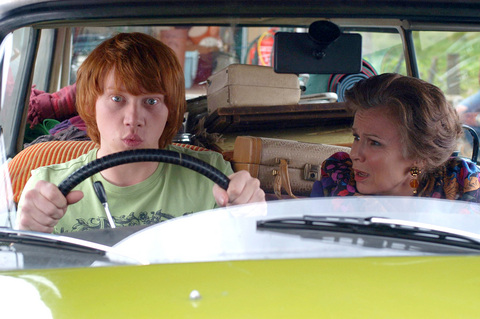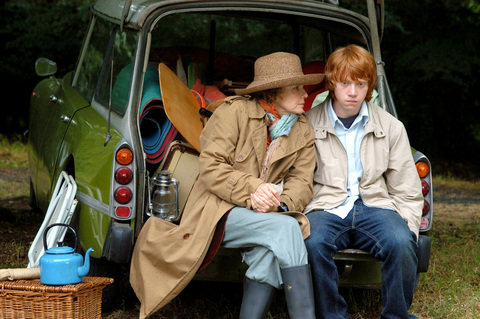Driving Lessons belongs to that hardy niche of British comedies designed as star vehicles for distinguished actresses (preferably Dames) of a certain age whose assignment is to win awards by devouring the scenery. Julie Walters, who does the chomping in Driving Lessons, isn't yet a Dame like Maggie Smith, Judi Dench and Joan Plowright, who specialize in such tasks. But the movie carries Walters, who established her scenery-chewing credentials with Educating Rita, a step in that direction.
Walters is Evie Walton, a retired actress and legend in her own mind, who has affixed a bogus title to her name and flaunts a disheveled grandiosity to go with it. Despite her background interpreting Shakespeare and Chekhov, Dame Evie, as she calls herself, is known to the younger generation only from a trashy daytime soap opera called "The Shipping Magnates," which one gushing follower of the show describes as "big on the gay scene." When that fan parrots one of the catchphrases mouthed by Evie's character — "I'm a woman, Leland, not an oil tanker" — Evie is not amused, but we are.
Veering between imperiousness and wild eccentricity, Evie hurls curses at the vegetation in her backyard while attacking it with pruning shears. Visitors who call on her unexpectedly might arrive to find her facedown on the floor, drunk. A lover of the outdoors, Evie persuades a friend to drive her to a campsite for the afternoon and, once there, swallows the car key to ensure that they have to stay the night. The key will appear in the morning, she promises: she is "regular as clockwork."

PHOTOS COURTESY OF CMC
Evie tells whoppers. After an anxiety attack, she confides in her worried companion that she is suffering from a fatal illness and expects to die within months. A day or two later, she has forgotten this fabrication until he reminds her of it, and she dismisses her fib as nothing.
Her companion on the road, Ben (Rupert Grint, the talented young actor who has played Harry Potter's sidekick in four films), is a shy, carrot-topped youth from a strict Christian household who takes a job as Evie's assistant. Ben dabbles in poetry and pines after a priggish Bible-spouting girl in his church.
Driving Lessons is the directorial debut of Jeremy Brock, who wrote the screenplays for Mrs. Brown and Charlotte Gray. It was inspired by Brock's teenage experience working one summer for Dame Peggy Ashcroft.

The dramatic core of the movie is the struggle for Ben's soul waged between two female monsters: one lovable (Evie), if impossible, and the other thoroughly detestable (Ben's holier-than-thou Bible-thumping mother, Laura). Played by Laura Linney with an impeccable British accent that matches her character's smiles of icy piety, Laura is treated with a loathing rarely seen in movies since the Freudian 1950s, when evil, castrating moms made convenient scapegoats.
This movie is no friend of the church. Ben's emasculated father, Robert (Nicholas Farrell), is an ardent bird-watcher who delivers mealy-mouthed sermons and would rather warble birdcalls to his son than develop any meaningful communication. The monster mother, meanwhile, is having an adulterous affair with the handsome young man handpicked to play Jesus in a church pageant she is overseeing.
Ben's role in this ridiculous charade is a eucalyptus tree. When this spectacle is finally put on and goes amok with the appearance of Evie, the image of Ben peering miserably through his costume of leaves and branches is laugh-out-loud funny.
In a bizarre act of charity, Laura has also brought into the house a cross-dressing lunatic named Fincham (Jim Norton), who ran over his wife. The character, who develops an obsession with wearing Laura's clothes, is strictly a plot device, reserved for one act of rebellion near the end of the movie.
It is through Evie that Ben learns to break his mother's rules. Although he hasn't earned a driver's license, Evie insists he be her chauffeur. Violating Laura's curfew, he takes Evie camping and later shepherds her to a literary festival in Edinburgh. Their relationship metamorphoses from embattled to mutually nurturing.
The screwball aging diva genre isn't the only formula guiding this stubbornly old-fashioned movie. Driving Lessons belongs to the silly feel-good mode of The Full Monty, Calendar Girls, Billy Elliot, Kinky Boots and dozens of other celebrations of Britons defying convention to become "free," whatever that means. Since any connections between Driving Lessons and the real world are tangential at best, it's a faux liberation: the easiest kind.

Under pressure, President William Lai (賴清德) has enacted his first cabinet reshuffle. Whether it will be enough to staunch the bleeding remains to be seen. Cabinet members in the Executive Yuan almost always end up as sacrificial lambs, especially those appointed early in a president’s term. When presidents are under pressure, the cabinet is reshuffled. This is not unique to any party or president; this is the custom. This is the case in many democracies, especially parliamentary ones. In Taiwan, constitutionally the president presides over the heads of the five branches of government, each of which is confusingly translated as “president”

Sept. 1 to Sept. 7 In 1899, Kozaburo Hirai became the first documented Japanese to wed a Taiwanese under colonial rule. The soldier was partly motivated by the government’s policy of assimilating the Taiwanese population through intermarriage. While his friends and family disapproved and even mocked him, the marriage endured. By 1930, when his story appeared in Tales of Virtuous Deeds in Taiwan, Hirai had settled in his wife’s rural Changhua hometown, farming the land and integrating into local society. Similarly, Aiko Fujii, who married into the prominent Wufeng Lin Family (霧峰林家) in 1927, quickly learned Hoklo (commonly known as Taiwanese) and

The low voter turnout for the referendum on Aug. 23 shows that many Taiwanese are apathetic about nuclear energy, but there are long-term energy stakes involved that the public needs to grasp Taiwan faces an energy trilemma: soaring AI-driven demand, pressure to cut carbon and reliance on fragile fuel imports. But the nuclear referendum on Aug. 23 showed how little this registered with voters, many of whom neither see the long game nor grasp the stakes. Volunteer referendum worker Vivian Chen (陳薇安) put it bluntly: “I’ve seen many people asking what they’re voting for when they arrive to vote. They cast their vote without even doing any research.” Imagine Taiwanese voters invited to a poker table. The bet looked simple — yes or no — yet most never showed. More than two-thirds of those

In the run-up to the referendum on re-opening Pingtung County’s Ma-anshan Nuclear Power Plant last month, the media inundated us with explainers. A favorite factoid of the international media, endlessly recycled, was that Taiwan has no energy reserves for a blockade, thus necessitating re-opening the nuclear plants. As presented by the Chinese-language CommonWealth Magazine, it runs: “According to the US Department of Commerce International Trade Administration, 97.73 percent of Taiwan’s energy is imported, and estimates are that Taiwan has only 11 days of reserves available in the event of a blockade.” This factoid is not an outright lie — that